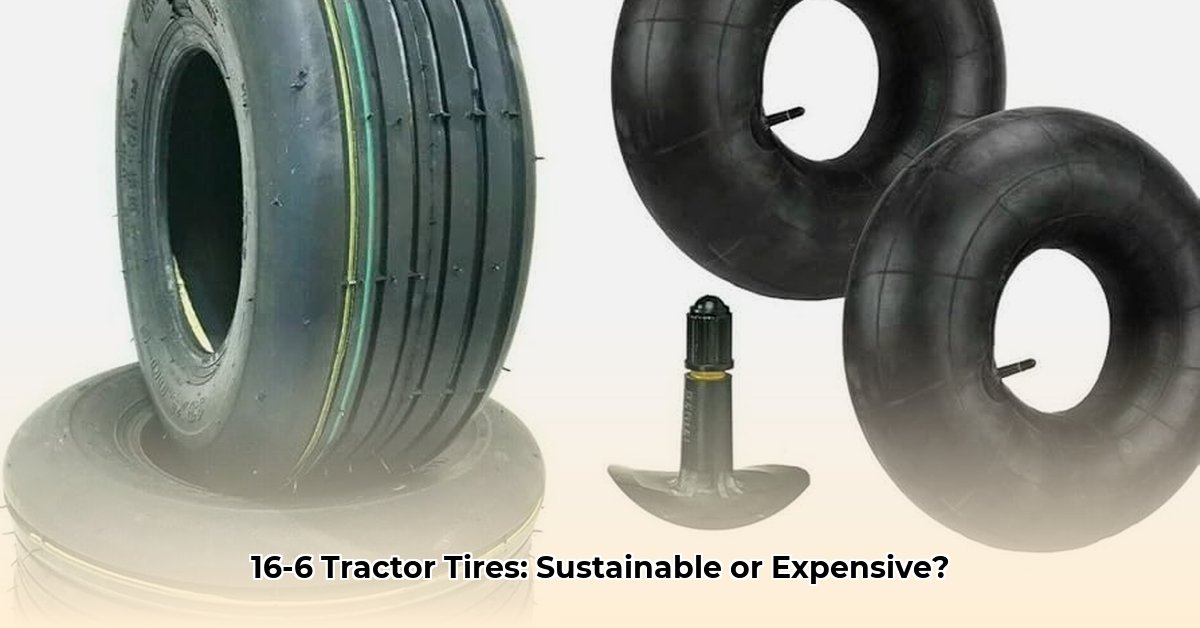
Farming practices are increasingly emphasizing sustainability, leading to a surge in interest in eco-friendly equipment. A key area of focus is tractor tires, with claims that lower-cost 16-6 tires offer a sustainable solution. However, a thorough cost-benefit analysis reveals a significant data gap, raising questions about whether low initial cost equates to genuine environmental sustainability. For more information on tire sizes, check out this resource on different tractor tire sizes.
The Allure of Low-Cost 16-6 Tractor Tires
The agricultural sector constantly seeks ways to reduce operational expenses. Therefore, the promise of significantly cheaper 16-6 tractor tires, as advertised by some vendors like Tires-Easy, is inherently appealing. This potential cost reduction could free up resources for other farm investments or improve overall profitability. However, focusing solely on initial price overlooks the crucial aspect of long-term environmental impact. Is a lower upfront cost justifiable if it comes at the expense of hidden environmental costs throughout the tire's lifespan?
Cost Versus True Sustainability: Examining the Claim
The attractiveness of low-cost 16-6 tractor tires shouldn't overshadow the need for a nuanced understanding of "sustainability." A truly sustainable tire requires a comprehensive lifecycle assessment (LCA), considering its entire lifespan—from raw material extraction to end-of-life disposal. This involves evaluating environmental impacts at each stage, not just the initial purchase price. A superficial cost comparison is insufficient to determine the genuine environmental impact. The analogy of purchasing a fuel-inefficient vehicle applies: initial cost savings might be negated by higher fuel consumption and maintenance costs over time.
The Missing Pieces of the Sustainability Puzzle: Where's the Data?
A major impediment to evaluating the sustainability of 16-6 tractor tires is the paucity of comprehensive data. Robust, independent studies are necessary to analyze their lifecycle environmental impacts. Crucially, these studies must include a detailed LCA covering the carbon footprint of materials, manufacturing, use and disposal. Without such comprehensive assessments, claims of sustainability remain speculative and lack scientific validation. The absence of this data prevents a reliable comparison with alternative tire options.
Tire Performance: Beyond the Price Tag
Sustainable solutions extend beyond initial cost. Tire performance directly influences fuel efficiency, longevity, and overall farm productivity. A tire with inadequate traction or a short operational lifespan can lead to increased fuel consumption, more frequent replacements, and higher maintenance costs. These factors significantly impact both farm profitability and the overall environmental footprint. A compelling lack of data makes it difficult to evaluate the comparative performance of budget-friendly 16-6 tractor tires against potentially more sustainable alternatives.
Stakeholder Perspectives: A Collaborative Approach
Addressing the information gap and promoting true sustainability in agricultural tires requires collaboration among various stakeholders. Tire manufacturers must conduct and transparently publish comprehensive LCAs. Independent research institutions should conduct rigorous field trials comparing various 16-6 tractor tires, focusing on environmental impact, performance, and cost-effectiveness. Farmers need access to clear, reliable sustainability data to make informed purchasing decisions. Finally, government agencies should consider incentives and regulations that promote the development and adoption of truly sustainable tires.
Conclusion: The Need for Data Transparency and Further Research
In short, the sustainability of 16-6 tractor tires cannot be assessed solely by their price. A holistic evaluation encompassing lifecycle environmental impacts and practical performance is crucial. The absence of comprehensive, independent data currently makes it impossible to definitively endorse any specific tire as "sustainable." A collective and transparent effort from manufacturers, researchers, and policymakers is vital to accelerate progress towards environmentally responsible farming practices. Further rigorous research is urgently needed to fill the current data gaps and promote informed decision-making within the agricultural sector.